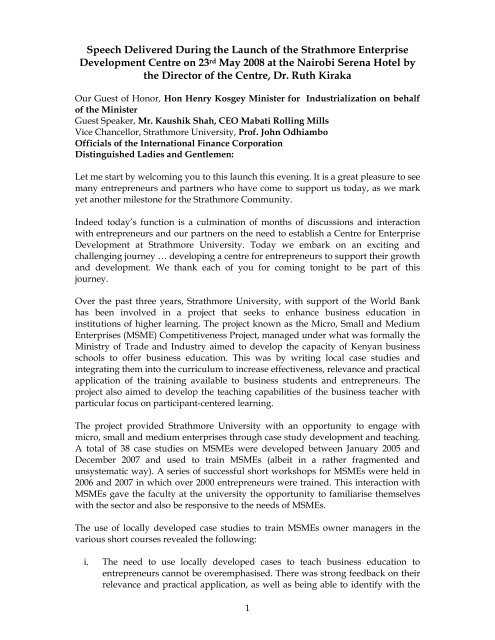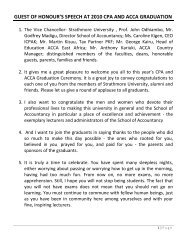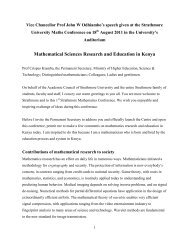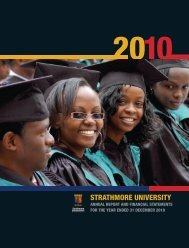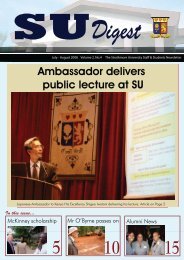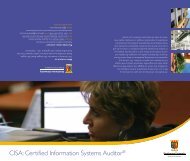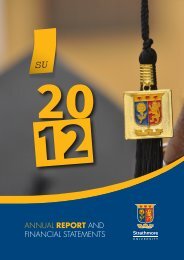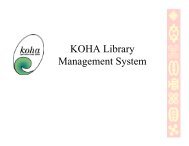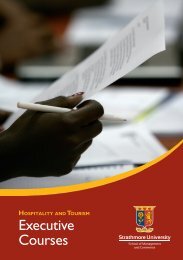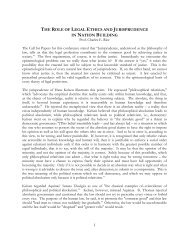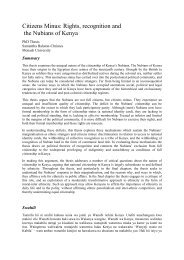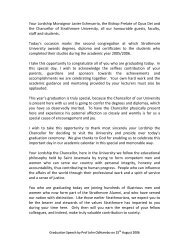ICE Dean's Speech - Strathmore University
ICE Dean's Speech - Strathmore University
ICE Dean's Speech - Strathmore University
- No tags were found...
You also want an ePaper? Increase the reach of your titles
YUMPU automatically turns print PDFs into web optimized ePapers that Google loves.
ii.iii.iv.issues in the case studies. This made the training both interesting andbeneficial, and left participants asking for more;There was need for systematic structured training for entrepreneurs. Many ofthem said they had attended several ad hoc training sessions that had beenoffered by different players and therefore lacked coherence and some were notvery practical. They requested for more systematic and progressive training;There was need for on-going support to MSMEs beyond the training. Theyneeded on-going business counselling, consulting services, networkingmeetings, exhibitions, access to business information etc. Indeed we havereceived several requests to offer such services;There was need for business research to support and inform entrepreneurialventures. Many entrepreneurs start business based on a “hunch” or “gutfeeling”that they will be successful. Whereas it is important to have somelevel of confidence of success, such decisions need to be informed by marketresearch and data, a factor that is consistently lacking in the current MSMEbusiness environment.It is against this background, and with technical and financial support from theInternational Finance Corporation that the <strong>Strathmore</strong> Enterprise DevelopmentCentre is being launched today.The entrepreneur is constantly reflecting on three key questions: What are my goals?Do I have the right strategy? Can I execute the strategy successfully? We expect thatyou will find the answers to these questions at the SEDC.The Centre is envisaged to be a “one-stop-shop” for entrepreneurs that will providecomprehensive services that they need to support growth, development andinnovation.The Centre seeks to meet the needs of MSMEs in four key areas:Capacity building in business management: Through the six-month modularCertificate in Entrepreneurial Management course, the MSMEs will be equipped withthe skills necessary to operate their ventures optimally and profitably. Using locallydeveloped relevant case studies, and a highly participant-centred learningmethodology, the training areas will include the following: Managing businessoperations; Business law and taxation; Developing an effective marketing strategy;Financial management; Managing human resources; Business planning; Strategiesfor business growth; Using information technology for competitive advantage;Delivering excellent customer service and Risk management. (Other customisedcourses will also be offered as requested by entrepreneurs).The modular structure will allow entrepreneurs to spread their skill developmentover a period of six months, making the programme compatible with their work andgiving them time to implement the action plans they draw from each module in theirworkplace.2
Value-added Services: These include business counselling, networking meetings,business diagnostics, mentoring, exhibitions and corporate retreats. Other serviceswill include referring MSME owner managers to professional service providers whomay provide specialized services, consulting and information systems at affordablerates.Business Club: Those that have taken the Certificate in Entrepreneurial Managementcourse will be eligible to become business club members. As members of the clubthey will have access to the above value-added services at discounted prices and willalso have free access to the resource centre. The resource centre will have contactinformation of other MSMEs, the Kenyan SME toolkit which provides details on howto set up and manage small and medium enteprises and other useful information forthe successful running of an enterprise. The business club will also enable us to stayin touch with entrepreneurs and ensure we really are ‘Your Enterprise Partner’.Knowledge Hub: The knowledge hub will seek to provide access to resources forMSMEs to facilitate their operations. These will include promotion of the MSMEsector through MSME conferences, Annual Entrepreneur Awards, and an SMEbulletin. The hub will also offer practical resources to SMEs such as the Kenya SMEtoolkit, access to relevant industry research and access to a wide range of informationfor MSMEs. Another area of focus for the knowledge hub will be conductingindustry research and participating in policy formulation to help create an enablingbusiness environment for MSMEs.In Kenya, small and medium enterprises continue to generate a large share ofeconomic activity and employment. Starting and expanding a small business is oneof the most promising and sustainable routes of improving the standards of living ofour people. Whenever I meet small business people, I am struck by their resilienceand drive to succeed and make a difference. Because the benefits of small andmedium enterprises are far reaching and powerful, we are targeting them as a way ofmaking a contribution to improving the living standards of our Kenyan people.Our vision is broad, but so are the challenges. Poverty remains widespread and theresources to fuel the growth of small enterprises is often out of reach. Frequently, thebusiness environment is confusing, with regulations posing numerous and costlyhurdles to start, register and operate a business. We hope to be able to workeffectively with key players, particularly the government to see that these challengesare consistently being addressed.We look forward to welcoming you to the <strong>Strathmore</strong> Enterprise DevelopmentCentre and partnering with you to enhance your business growth.Let me welcome you once again and thank you for being part of this event tonight.God Bless You.3


